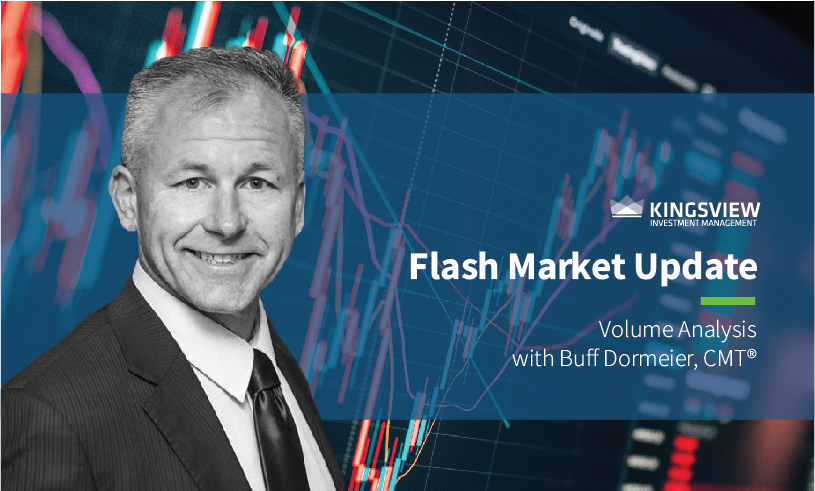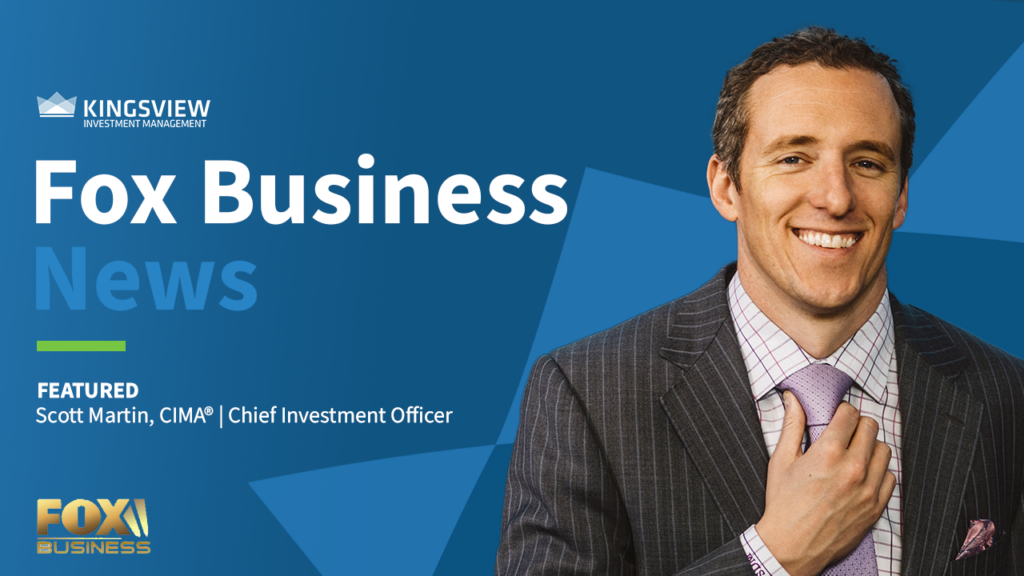Kingsview CIO Scott Martin On Fox News Weather Now 5.2.24

Click here to listen to the full interview.
STEVE BENDER: What impact is the severe weather having on farmers and what could that actually mean to your and my wallet? Right? Let’s get the read on this with King’s View Wealth Management, CIO and Fox business contributor, Scott Martin. Scott, it’s always good to talk to you and let’s start talking about this industry as a whole. We briefly went through the numbers, but help give us a better understanding of just how big of an industry this agriculture is here in the us.
SCOTT MARTIN: Steve Big and getting bigger, my friend. I mean, you talked about the numbers, whether it’s the trillion plus dollars of GDP contribution that agriculture has, the hundreds of billions of dollars, Steve, that these farms produce an output. And here’s the biggest thing, as we go more into the future, as we go into 25, 26, 27, the thirties, 2030s, that output from the farms in the agricultural sector is going to be bigger and bigger to our US economy. And bigger and bigger, to your point, to our wallets. Because as an economic guy, as somebody that looks at data all day long, on the economic side of things, we talk about inflation, we talk about gas prices, we talk about food prices, we’re talking about corn, wheat, soybeans, all those things that are grown, Steve, on those farms that are getting destroyed are just getting an increase in price just because of the demand. My goodness, man, that impact on price, the impact on our wallets is getting bigger and bigger to the consumer who has to pay more for the stuff that you buy at the grocery store.
STEVE BENDER: And Scott, I know you look at the numbers and you’re a big economic guy, but you also love the weather. I got to show you this video, by the way, that happened in Iowa. This actually happened live here on Fox brother earlier, and it was a grain silo that flew literally at one of our storm chasers. I know you and I were talking about going out, chasing this is Brandon Op, we should have been there. I know we should have been there, right? This was incredible. Watch as this invol unfold, Scott on the ground right in
VIDEO: Front of me, Vince on the ground,
STEVE BENDER: Right? He’s talking to his teammate here, Scott, right now, this would be you and I, you and would be talking about the dynamics, but before you know it, look at this grain silo weighs 50,000 pounds, comes barreling towards our guy, Brandon, and they’re just doing a quick K turn, booking it, getting out there as quickly as possible. I got to ask you, when you look at the fewer of these tornadoes, we talk about how it impacts businesses and homes. What kind of impacts does this have on farms and the farmers themselves?
SCOTT MARTIN: That’s kind of in a weird way, the lost art, Steve of this is like if a tornado doesn’t hit a city and terrible things that happened this last weekend, of course. But if you notice, man, some of the breakout that we had on Sunday was a lot of farmland. It’s everybody was kind of saying, oh, it’s not a big deal. It’s not near any cities, so it’s not impacting people. But my goodness, man, it’s hurting corn crops. It’s hurting wheat crops and cattle. I mean, a lot of cattle got hurt or destroyed or beaten up by the tornado. So there’s a lot of impacts that are outside that cityscape that we have to consider. And you mentioned that grain silo there, whatever was in that grain silo. Silo is ruined. I mean, that’s done. So that farm, that farmer, that farmland has to rebuild that grain silo, they lost the crop for that year most likely. And so that impact is residual. And not to mention insurance policies and things like that that have to go up in cost for them, but there’s that less delivery of supply, Steve, to the industry or to the marketplace, which drives up cost to an environment like this where we’re economically very sensitive to price events like this, whether they’re in cities or not, are really detrimental to the kind of ongoing inflation situation that we have going on in the United States.
STEVE BENDER: And Scott, you had brought up all the impacts, and we look at those in the Midwest. That’s the corn belt. And so we look at those areas. I mean, Iowa leads the country right now with confirmed tornadoes at 55, and that could actually increase. And you’re looking at those farmlands just ravaged, right, torn up and ripped apart because of tornadoes, but that’s not the only threat. You look at hailstorms, they wipe out some of those crops and then what’s next for them? How does the process work for farmers? Because we talk about businesses, they have insurance, do farmers have insurance and does it cover enough? Because I can’t imagine it covers everything. How do they bridge that gap?
SCOTT MARTIN: They do Steve, and there’s some reserves that get built up and things like that that cover it. You write about insurance policies, they get more complicated. And so now you have to pay more to get that coverage. And some of ’em have all these exclusionary clauses where they don’t cover everything. And so your point is well taken. What ends up happening is that farmer or that family has to decide, are we going to rebuild? Are we going to go through this again? And the damages just keep racking themselves up. The uncertainty keeps going up. The weather I love as deeply as you do, and I love severe weather. I really do because it’s just exciting. But the damages that are occurring from the weather nowadays is very difficult, especially as more populated we get as more crops get built or planted. But my goodness, man, if those farmers start to step out of the industry, let’s say they say you give up, they’re not going to do the business anymore. That decreases the supply and puts a lot more pressure on the open market. I mean, look at some of these scenes right now, all the destruction. Can you imagine being a farmer and having to go out there and see that and say, you know what, we’re going to rebuild and we’re going to be back in what, 2, 3, 4, 5 years and you can hit again. It’s just a very tough situation for them. So I feel for them very deeply.
STEVE BENDER: And we’ve actually seen the farming industry start to dwindle. I mean, since 2017 has dropped 7%, a lot of farmers aging out. It doesn’t look as robust as it once did, and now you have severe weather on top of that. That’s kind of making a lot of people hesitant. Big concerns about what happens when this pushes through. Hey, Kingsview Wealth Management, CIO and Fox business contributor, Scott Martin, of course. Thank you so much. And I love your passion and you know, and I are going to be talking soon, these big
SCOTT MARTIN: Weather events, we’re taking you up on that opera any day, so see you soon.
STEVE BENDER: All right. Hey, we’ll get the Fox beast loaded up and we’ll get out there into the severe weather. Scott, thank you for that.


